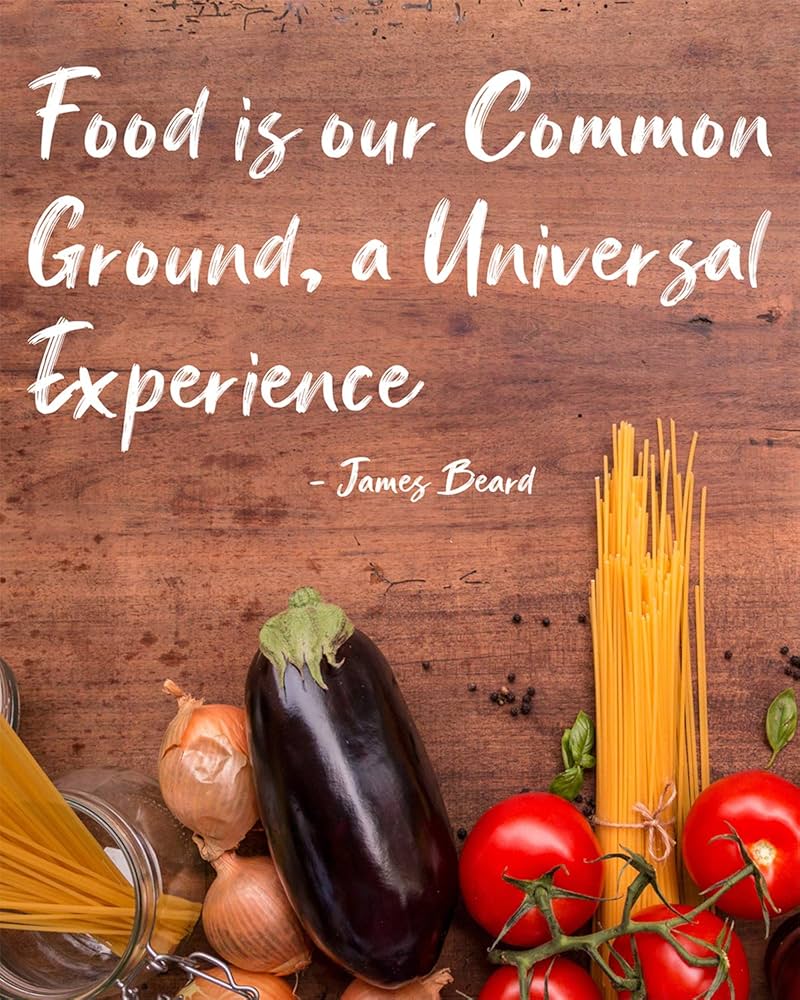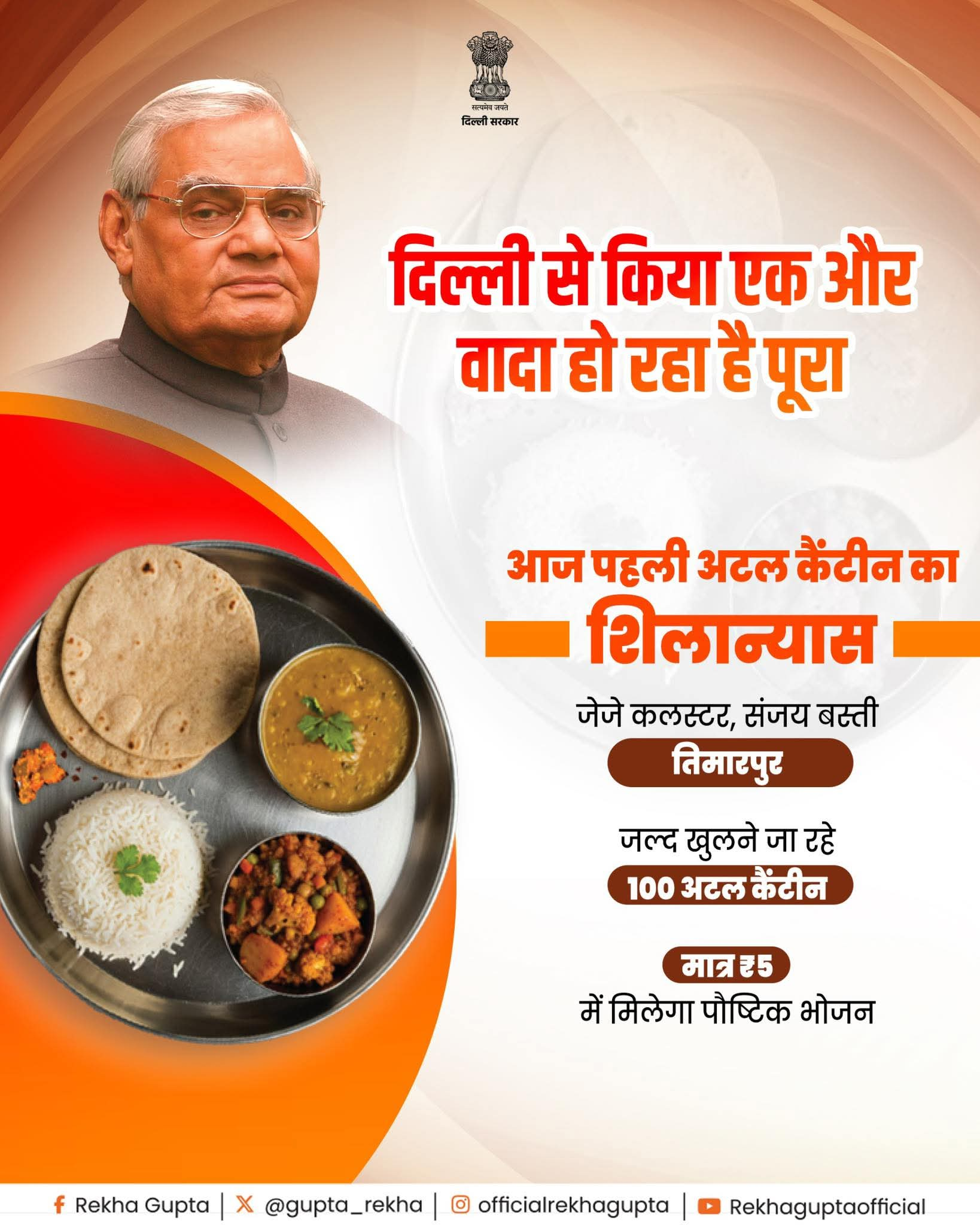“Food is our common ground, a universal experience”.

🍲 Food is Our Common Ground, a Universal Experience
Food is more than just sustenance—it is a language that transcends borders, cultures, and generations. The celebrated American chef James Beard once said, “Food is our common ground, a universal experience”. This simple yet profound statement captures the essence of how food unites humanity. Whether it is a family meal, a festive feast, or a humble street snack, food has the power to connect people in ways that words often cannot.
🌍 Food as a Cultural Bridge
Every culture has its own culinary traditions, yet the act of eating is universal. A Japanese sushi roll, an Indian thali, an Italian pizza, or a Mexican taco may look and taste different, but they all serve the same purpose: to nourish and to bring people together. When we share meals across cultures, we are not just tasting flavors—we are experiencing history, geography, and identity.
Food festivals, international restaurants, and even cooking shows highlight this cultural exchange. They remind us that while our recipes may differ, our desire to gather around a table is the same everywhere.
🥘 The Social Power of Food
Meals are rarely eaten in isolation. From family dinners to community feasts, food is often at the center of human interaction. Think of weddings, religious celebrations, or even business meetings—food is always present. It breaks down barriers, sparks conversations, and fosters bonds.
In many traditions, offering food is a gesture of hospitality and kindness. A shared meal can dissolve differences of language, religion, or nationality, creating a sense of belonging and unity.
🍇 Food as Memory and Emotion
Food is deeply tied to memory. The aroma of freshly baked bread might remind someone of childhood mornings, while the taste of a festive dish can transport us back to family gatherings long past. These sensory experiences are universal—everyone has a dish that feels like “home.”
This emotional connection makes food a powerful storyteller. Each recipe carries with it the legacy of ancestors, the struggles of migration, and the joy of celebration. In this way, food is not just nourishment for the body but also for the soul.
🌱 Food in a Globalized World
In today’s interconnected world, food has become a global ambassador. Ingredients and recipes travel across continents, blending traditions and creating new flavors. Fusion cuisine—like Korean tacos or Indian-style pasta—shows how cultures can harmonize through food.
At the same time, global challenges like hunger, sustainability, and food security remind us of our shared responsibility. Ensuring that everyone has access to healthy, affordable meals is a universal goal that unites humanity.
🧑🍳 Conclusion
Food is indeed our common ground. It is a universal experience that nourishes not only our bodies but also our relationships, cultures, and communities. Whether enjoyed in a lavish banquet or a modest kitchen, food reminds us of our shared humanity.
As James Beard’s timeless words suggest, the act of eating is more than a necessity—it is a celebration of life, connection, and togetherness. In every bite, we find a reminder that despite our differences, we are all part of the same human story.
“भोजन हमारी साझा ज़मीन है, एक सार्वभौमिक अनुभव” पर। साथ ही मैंने कुछ उपयुक्त चित्रों के लिंक भी दिए हैं जिन्हें आप लेख के साथ उपयोग कर सकते हैं।
🍲 भोजन हमारी साझा ज़मीन है, एक सार्वभौमिक अनुभव
अमेरिकी शेफ़ जेम्स बियर्ड ने कहा था – “Food is our common ground, a universal experience”। यह वाक्य हमें याद दिलाता है कि भोजन केवल पेट भरने का साधन नहीं है, बल्कि यह वह धागा है जो पूरी मानवता को जोड़ता है। चाहे भाषा अलग हो, संस्कृति अलग हो या परंपराएँ भिन्न हों—भोजन हर जगह लोगों को एक साथ लाता है।
🌍 भोजन: संस्कृतियों का सेतु
हर देश और समाज की अपनी विशिष्ट पाक परंपराएँ होती हैं। भारत का मसालेदार करी, जापान का सुशी, इटली का पास्ता या मैक्सिको का टैको—ये सभी अलग-अलग स्वाद और रूप में मिलते हैं। लेकिन इन सबका उद्देश्य एक ही है: शरीर को पोषण देना और लोगों को जोड़ना।
जब हम किसी दूसरे देश का भोजन चखते हैं, तो हम केवल स्वाद ही नहीं बल्कि उस संस्कृति का इतिहास, भूगोल और जीवनशैली भी अनुभव करते हैं। यही कारण है कि भोजन सांस्कृतिक आदान-प्रदान का सबसे सरल और प्रभावी माध्यम है।
🥘 सामाजिक संबंधों में भोजन की भूमिका
भोजन हमेशा से सामाजिक मेलजोल का केंद्र रहा है। परिवार का रात्रिभोज, विवाह का भोज, त्यौहारों की दावतें या फिर दोस्तों के साथ चाय—हर अवसर पर भोजन मौजूद रहता है। यह बातचीत को सहज बनाता है, रिश्तों को गहरा करता है और समुदाय में अपनापन पैदा करता है।
कई संस्कृतियों में अतिथि को भोजन कराना सबसे बड़ा सत्कार माना जाता है। यह परंपरा बताती है कि भोजन केवल शरीर का नहीं, बल्कि दिलों का भी पोषण करता है।
🍇 भोजन और स्मृतियाँ
भोजन हमारी यादों और भावनाओं से गहराई से जुड़ा होता है। माँ के हाथ की रोटी, दादी की बनाई मिठाई या किसी त्यौहार का विशेष पकवान—ये सब हमें बचपन और अपनेपन की याद दिलाते हैं।
हर व्यंजन अपने साथ एक कहानी लेकर आता है—कभी प्रवास की, कभी संघर्ष की, तो कभी उत्सव की। यही कारण है कि भोजन केवल स्वाद नहीं, बल्कि भावनाओं और इतिहास का भी वाहक है।
🌱 वैश्विक दुनिया में भोजन
आज की वैश्विक दुनिया में भोजन सीमाओं से परे जा चुका है। इंटरनेट और यात्रा ने हमें दुनिया भर के व्यंजनों से परिचित कराया है। फ्यूज़न डिशेज़ जैसे कोरियन टैको या इंडियन पिज़्ज़ा इस बात का प्रमाण हैं कि भोजन संस्कृतियों को मिलाने का माध्यम बन चुका है।
लेकिन इसके साथ ही भूख, खाद्य असमानता और पर्यावरणीय चुनौतियाँ भी सामने हैं। यह हमें याद दिलाता है कि भोजन केवल व्यक्तिगत अनुभव नहीं, बल्कि सामूहिक ज़िम्मेदारी भी है।
🧑🍳 निष्कर्ष
भोजन वास्तव में हमारी साझा ज़मीन है। यह हमें जोड़ता है, हमारी विविधताओं को एक धागे में पिरोता है और हमें यह एहसास कराता है कि हम सब एक ही मानव परिवार का हिस्सा हैं।
जेम्स बियर्ड के शब्दों में, भोजन एक सार्वभौमिक अनुभव है—एक ऐसा अनुभव जो हमें जीवन का उत्सव मनाने और एक-दूसरे से जुड़ने का अवसर देता है।











Leave a Reply